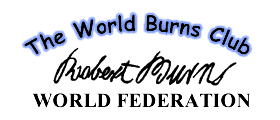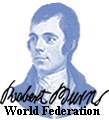


 |
 |
 |
F.A.Q. :- "I
have just read one of Burns poems but do not understand many of the words.
Please help !"

"When I thought of an answer
to the questions, I found that I could give a ready answer to 'why did I
attempt the translations', the reason for the interest was more difficult
and required a great deal of introspective thinking. Let me tackle the first
part first. I would say that a form of osmosis fostered the interest in
Burns. My father was an amateur musician, who played the soprano cornet
in the Tullis Russel Paperworks brass band, and also played the piano. I
could remember him singing to most of my cousins the Burns lullaby, 'Bonnie
Wee Thing'. I am sure that he also sang the lullaby to me but very young
children do not remember events below a certain age. At the time I didn't
know that this was one of Burns works. It was very effective in putting
the children to sleep, and I used it on my own children and grandchildren
to good effect. Another song he would sing was 'Up In The Morning No For
Me' even though he was an early riser. Again I had no knowledge that Burns
had composed this work. The next stage was when I attended secondary school.
The first contact was with the dreaded music period of the weekly class
room work. The only song I can remember from this period was 'Scots Wha
Hae'. I can't honestly say whether I was told that the author was Robert
Burns. In the English class I was subjected to a dose of English poets,
but one poem stands out in memory and that was "Tam O Shanter".
Again I can't say that it was explained to me that the author was Burns.
I did recognize that the words were in the Scottish dialect, and the story
stirred the blood. Of course there was always the good old stand-by "Auld
Lang Syne", where every Scots and lots who are not, at least know the
chorus. I don't know when I bought my first book of Burns' poems, but it
was not with an intention to study his work in depth, but to read some of
his better known poems such as "To a Mouse", "To a Louse",
and "Tam O Shanter".
Now on to the next stage of my interest in Burns, where I started
to translate some of his works. How I became interested in translating was
not in tackling Burns but with a more mundane poem. An American friend,
Tony Travelli, who worked in the parent company to our Canadian division,
went to Scotland for a vacation. On his return he forwarded to me a copy
of a Scottish magazine which had in it three poems in the Scots dialect.
One of these was titled "The Boy in the Train", telling the story
of a boy travelling with his parents from Edinburgh to Kirkcaldy, (my hometown),
to visit his grandmother. This was one other poem that both my wife and
I had been given in English class. At one time we had a copy that we kept
from a newspaper clipping. Over time the paper became brown and crumbled,
and we lost some of the words. For the life of us we could not remember
what they were. I wrote a letter to Tony thanking him for the magazine,
but especially for the poem. In his reply to my letter he asked if he could
get a copy of the poem. When I considered how to do this I came to the conclusion
that it would be of little value in sending him a Xerox copy, as he would
not be able to understand language. I decided to translate not only "The
Boy in The Train", but two others that were in the magazine. They were
"Cuddle Doon" (Cuddle Down) and "The Sair Finger" (The
Sore Finger). Now we get to Burns' translations. I decided that in the interest
of international relations, and as my contribution to cultural enhancement
I would try my hand at translating some of Burns better known works. I began
with "To a Mouse", "To a Louse" and "Tam O Shanter"
because those were the three that I knew best. Others followed as I went
further in to the task. I should explain that when I started this chore
it was not my intention to translate all of Burns' poems. As I progressed
two things changed my attitude to the task. The first was that as I delved
deeper into the task, I became more understanding of Burns as a man with
a very keen intellect and sympathy to his fellow man. Most of my early translations
were done with a degree of enthusiasm to the task. It was later when I came
to some of which to me were insignificant pieces of work, (my apologies
to Burns enthusiasts), that it became a tedious chore to be completed."
George's translation work will prove invaluable to many people throughout the world who share an interest in Burns poetry or would like to understand more about his work. We will be introducing his translations gradually over the coming weeks with the intention of providing a complete archive of all of the poems.